Keywords are the heart and soul of an online marketing campaign, and so you need to pay special attention to the ones you choose. Most of the keywords being entered into Google and other search engines trigger both organic and paid results:
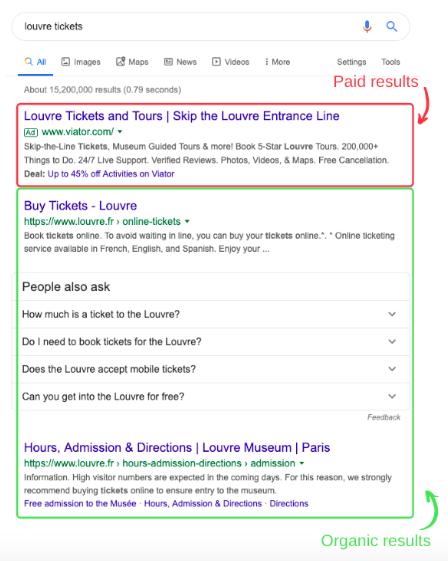
However, despite the SERP (search engine results page) being the same, you need to take different approaches when searching for SEO and PPC keywords. For a PPC campaign, it’s crucial to understand keyword match types and pay attention to keyword CPC and search volume, while for SEO the main metrics to look at are keyword search volume and keyword difficulty. Let’s explore these approaches in more detail.
Keyword match types for Google Ads (formerly AdWords)
What most people don’t realize is that the keyword match types you select have a bearing on the results you achieve. For AdWords (now Google Ads) keywords, there are five different match types. You need to know each type in detail so that you can make the right decision regarding which ones you want to add to your campaign.
These are the five main keyword match types:
Broad match (max reach, min relevance)
Modified Broad match (slightly lower reach, greater relevance)
Phrase match (medium reach, medium relevance)
Exact match (min reach, max relevance)
Negative match (usually used to increase the relevance of the website visitors)
Pro tip: what PPC specialists need to take into account is that Google keeps modifying the definitions of these match types, making every match type broader. In 2019, exact and phrase match keywords include many more variations than just two years ago. It doesn’t make sense anymore to include misspellings and typos as separate keywords: now they are recognized and included as close variations of the “original” keyword.
Broad match
Broad match keywords are the ones that enable you to reach the widest audience possible, letting you drive a larger volume of traffic to your website.
Broad match is the default match type used by Google Ads. If you add keywords just as they are (without special symbols such as [ ] and +), you need to be ready for Google to show your ads for a much wider range of search queries. Broad match type keywords have the most drawbacks of the three options: the traffic your website will receive won’t be refined; most visitors will be random individuals who stumbled across your ad; moreover, some of the keywords your ads will be shown for can be totally irrelevant to the theme or topic of your website or blog.
Broad match keyword: women’s hats
Matching searches:
buy ladies hats
women’s clothing
women’s scarves
winter headwear for women
Modified broad match
This match type allows you to gain more control over your search appearance and increase the relevancy of the traffic you attract with PPC ads. This is how modified broad match keywords look:
Modified Broad match keyword: +women’s +hats
Matching searches:
women’s scarves and hats
winter hats for women
hats for stylish ladies
If you have a raw keyword list you’d like to quickly change the match type for, you can do it with the Semush PPC Keyword tool.
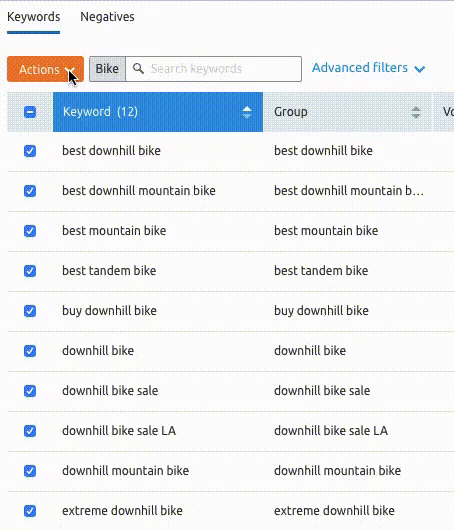
Phrase match
Phrase match keywords lie somewhere in between: they are more focused than broad match keywords but less so than exact ones. This does provide you with greater flexibility in terms of getting visitors to your website.
In phrase match keywords, additional words can be added either before or after, but not in the middle of the key phrase.
Phrase match keyword: “women’s hats”
Matching searches:
blue women’s hats
buy hats for women
ladies hats on sale
Exact match
Exact match keywords are the diametric opposite of broad keywords. As the name clearly states, these keywords are based on exact search queries and terms, down (or almost) to the last detail. The search query has to match the keyword exactly for the search engine to trigger your ad to show up. This makes this the most difficult of all types of keyword matches to conquer. However, the traffic you generate through exact match keywords is curated and easier to convert for you.
Exact match keyword: [women’s hats]
Matching searches:
women’s hats
ladies hats
hats for women
hats women
The probability of an exact match is low, so the traffic you get to your website will be lower than you drive through broad or phrase match keywords. To increase the volume of traffic, you will have to add more keywords to your campaign. Still, the fact that the chances of conversion are highest means that even low traffic could boost your sales.
Negative match
Let’s suppose you sell interior paints. You will advertise your products for people looking for paints, finishes, enamels, water-based and oil-based paints, etc. But you don’t want your ads to show up for art paints - gouache, watercolor, tempera and so on.
Negative match keywords will solve this problem. With this keyword type, you can exclude your ads to show up for certain search terms.
Tip: when adding negatives, you can use all the abovementioned match types to determine how strict these restrictions should actually be. See this Google article for more detail.
Doing keyword research for SEO
When it comes to organic SERPs, you need to work with keywords differently than in PPC. That means you need to alter your approach to your keyword research. In organic results, Google basically treats every search query as a broad match type keyword (if you don’t use advanced search operators, of course). This means you have much less control over what keywords your content will be shown for, but really there’s no need to worry about it because you don’t pay for every click. Search engine algorithms have evolved significantly, and it’s no longer necessary to use your target keyword in the exact same way in your content to get ranked high. In the screenshot below, the word “fix” is highlighted, even if it’s not present in the query:
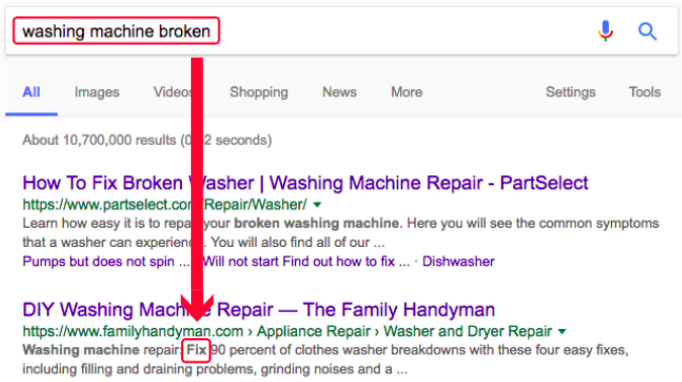
Google takes into account many metrics and factors (such as TF-IDF, for example) to determine if a particular piece of content is worth ranking for a particular keyword. With this in mind, the recommendations for keyword usage mention writing as “naturally” as possible, including various synonyms, close variations and semantically related words - in the way we usually speak.
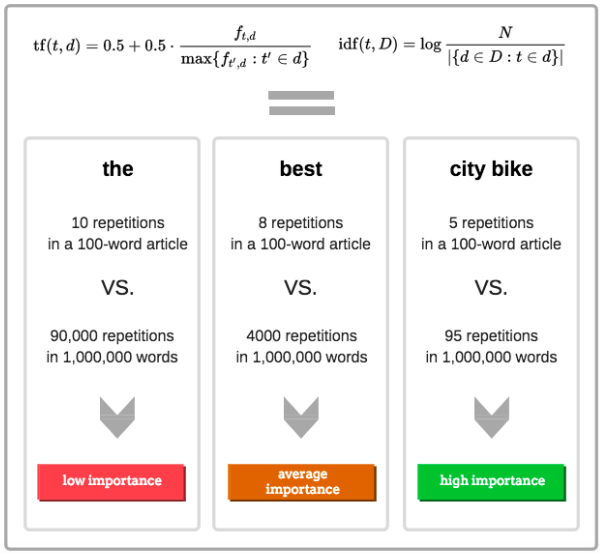
Leverage the power of question keywords (and boost your CTR)
Question keywords have become extremely important since Google introduced Featured Snippets. You must have seen them many times: they occupy most of the above-the-fold space, making other websites on the SERP almost invisible.
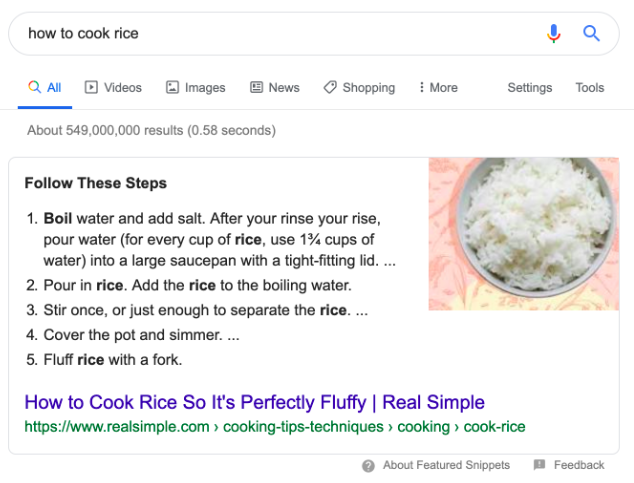
Getting into the Featured Snippet can increase your CTR by 114% (see the example of Hubspot). Most likely, you would be happy to get a similar traffic boost, and this is why you need to treat such keywords in a specific way. Question keywords can be found in any topic; a quick way to distill them down is to use a dedicated tool.
SEMrush’s Keyword Magic tool allows you to identify question keywords in a click:
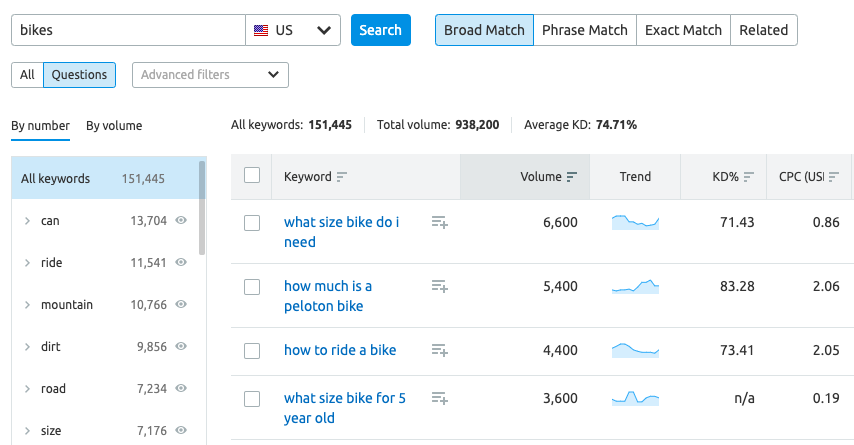
Once you’ve gathered enough question keywords and start creating content for them (or optimizing existing content), don’t forget to pay attention to implementing Schema markup - this will help Google better crawl and “understand” the content on your page.
Mind the Keyword Difficulty
In PPC, the core metric to pay attention to is cost per click (CPC). In SEO, it can also be useful - the higher the CPC, the tighter the competition can be in organic results too. However, there’s another metric that helps you understand how hard it could be to rank for a particular keyword organically. It’s called keyword difficulty. It tends to be more reliable than CPC because in paid search the cost per click can change every minute, or rise and fall depending on business hours.
There are several tools to check keyword difficulty. SEMrush has two options:
Keyword Difficulty tool - to check multiple keywords at once:
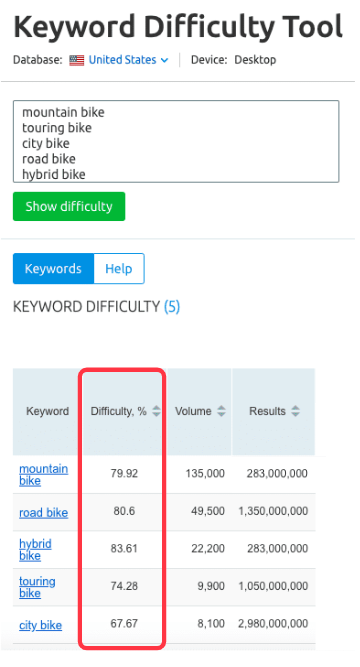
Keyword Magic Tool - to calculate KD for a particular keyword and for semantically related words.
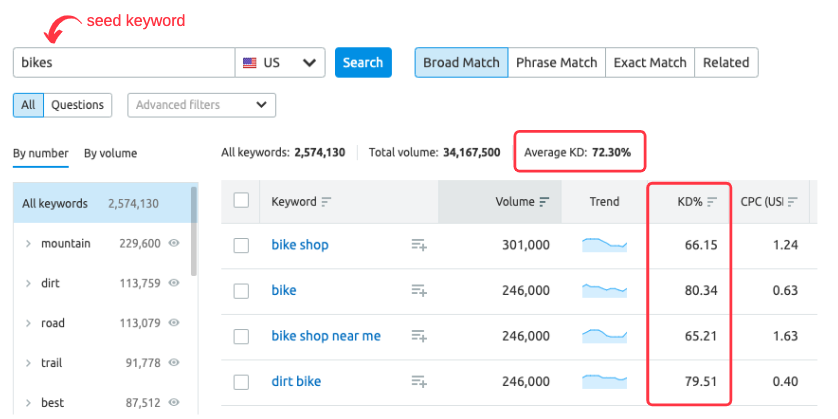
Choosing the right tool for keyword research
Now you have a better idea of what each keyword match type brings to the table and how you can use each one to your benefit. Also, you will be aware of the differences between the different keyword types. At the end of the day, the goal when using SEO keywords and AdWords keywords is to get more traffic to your website and each of the match types enables you to get just that. Take all factors into consideration when deciding which one you want to use.
Using a keyword search tool to discover the best keywords for your campaign for each match type can reduce the effort you need to put in. SEMrush’s keyword search tool helps you find the most relevant keywords you can use in your SEO and PPC campaigns while also providing you with a spreadsheet to organize them. In other words, SEMrush gives you the support you need for managing the keywords you are using in your campaigns.
Innovative SEO services
SEO is a patience game; no secret there. We`ll work with you to develop a Search strategy focused on producing increased traffic rankings in as early as 3-months.
A proven Allinclusive. SEO services for measuring, executing, and optimizing for Search Engine success. We say what we do and do what we say.
Our company as Semrush Agency Partner has designed a search engine optimization service that is both ethical and result-driven. We use the latest tools, strategies, and trends to help you move up in the search engines for the right keywords to get noticed by the right audience.
Today, you can schedule a Discovery call with us about your company needs.
Source:





![How to Find Low-Competition Keywords with Semrush [Super Easy]](https://allinclusive.agency/uploads/images/how-to-find-low-competition-keywords-with-semrush-super-easy.svg)